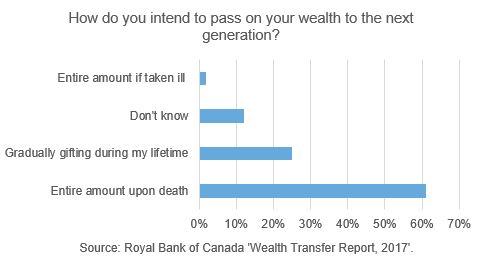Intergenerational wealth: Opportunities & risks for advisers
Last time we looked at what intergenerational wealth is and why everyone is talking about it. As we saw, the UK is on the brink of a vast shift in assets, unlike any that has been before. Thanks to a number of reasons (such as property, equity markets, DB transfers and longer life expectancies) £5.5 trillion will move hands in the United Kingdom between now and 2055. Au fait advisers need to start thinking TODAY about how this shift in assets will affect their clients and their bottom line.
Intergenerational wealth: Opportunities for advisers
Assets under management and firm-value have potential to grow
The race is on. A whopping £1 trillion will move hands between now and 2027.1 Spouses, children, grandchildren (and nominated persons) are going to receive large bulk sums of cash money, all in one go. With this change in asset ownership comes great opportunity for advisers. A new set of clients, a new set of objectives. Given the slowing property market, reduced DB transfer figures and economist’s expectations of recession being around the corner, inheritors are likely to seek alternative investment solutions. This could see a substantial and weighty shift for the amount of assets under management by financial advisers.
How do people plan to pass on their wealth?
The below chart shows that over 60% of people plan to pass their entire wealth upon death. Though this may seem understandable (due to many holding onto their assets to sustain their lifestyle, or due to the taboo subjects that are money and death), limiting one’s wealth to full transition on death may actually not be the most sensible thing to do. In fact, the inheritance tax burden alone should warrant some pre-death distribution.
Action for advisers: Promote inheritance planning and professional advice
Advisers should start looking today at ways to engage clients about the importance of effective inheritance planning, and the benefits to transferring wealth during their lifetime. Furthermore, with a massive 12% of people answering, ‘Don’t know’ when asked how they intend to pass on their wealth, there is a huge opportunity for advisers to showcase the importance of professional advice.
Intergenerational wealth: Risks for advisers
Client bank and changing objectives
As with any great change to the status quo, there are risks and considerations to be managed, along with regulatory requirements. Over the next few decades, adviser client banks will change significantly and so will client risk profiles. In addition, as clients age and approach the end of life, the number of so-called ‘vulnerable clients’ will increase, bringing with them a whole host of new needs and challenges. Critically, many benefactors haven’t fully thought about, or made thorough plans, for even the most basic form of wealth transfer. Only 26% of people have a full strategy in place to transfer their wealth to the next generation, while 1 in 3 indicate they have done nothing at all to prepare for passing on wealth to the next generation.2
Action for advisers: 360° engagement
By the same token, advisers need to consider how aligned their existing client’s investment propositions are with their future clients’. Take a 360° approach. Engaging with inheritors today will give them (and you) a much-needed head start – may that be ‘the Sandwich Generation’ (those who support both their children and their parents) or the younger generations (those between 18-35). Future clients will have different objectives, such as university funds or house deposits. The best way to get ahead is to encourage benefactors to engage with the family as a whole, and plan for how these objectives can be satisfied now, rather than on death.
Asset and client retention
Current client retention rates following asset-transition after death are disappointing and indicate that soon-to-be inheritors are unlikely to stick with the same adviser as their parents/grandparents. Indeed, According to Victor Preisser, co-founder of the Institute for Preparing Heirs3:
“Over 90% of heirs promptly change advisers when they receive their inheritances, and 70% of families lose control of their assets when an estate is transitioned to the next generation”
Action for advisers: Re-address client segmentation plans
This shift in assets is being seen by many advisers in their client banks. It can either be viewed as an opportunity to attract new clients and retain existing ones; or, without a strategy to capitalise on this trend, it could be a risk.
360° degrees of financial advice
Tackling intergeneration wealth from all angles
At Russell Investments, we know that just around the corner, the Great Wealth Transfer will bring about great change. But it isn’t too late. Over the next few months, we will be discussing the numerous way that financial advisers – big and small – can prepare. So, watch this space for an insight into how intergenerational wealth will affect the following:
- The ‘Sandwich Generation’
- ‘Vulnerable clients’
- ‘Millennials’
- Your practice and your bottom line
As a starter for ten, we provide tools and insights to help plan, build and expand your business against the changing market backdrop. For this topic in particular, we provide courses that help you to prepare for the increase in vulnerable clients and to develop an investment plan suitable for the ‘Sandwich Generation’, inclusive of families and youngsters.
For any questions please get in touch with Mark Hayhoe.
1 Source: Kings Court trust, ‘Passing on the Pounds – The rise of the UK’s inheritance economy’. 2017, p. 10
2 Source: Royal Bank of Canada, ‘Wealth Transfer Report 2017’. 2017, p. 3.
3 Source: http://www.wealthmanagement.com/data-amp-tools/retaining-heirs-wealthy-clients.
